
Recycling
metrics 2024
Empowering global knowledge in resource recovery.
Introduction
Recycling is a renowned international open access journal published by MDPI that has been dedicated to advancing the field of recycling and waste management since its inception in 2015. With a focus on innovative technologies, management practices, and policy frameworks, this journal serves as a platform for researchers, professionals, and students who are eager to explore sustainable solutions in resource recovery and material efficiency. Based in beautiful Basel, Switzerland, Recycling boasts an impressive impact with a 2023 ranking of Q2 in Management, Monitoring, Policy and Law and Q1 in Materials Science (Miscellaneous), signifying its pivotal role in driving forward-thinking research in these critical areas. The journal is indexed in Scopus, with strong performance metrics highlighting its relevance and quality, such as a rank of #42 in Waste Management and Disposal. As an open access publication, Recycling promotes the dissemination of knowledge, ensuring that groundbreaking research is freely available to a global audience. Whether you are a seasoned researcher or a student eager to contribute to the discourse surrounding sustainable practices, Recycling provides a vital resource for those committed to the future of waste management and environmental sustainability.
Metrics 2024
 -
- 4.60
4.60 4.30
4.30 -
-Metrics History
Rank 2024
IF (Web Of Science)
JCI (Web Of Science)
Quartile History
Similar Journals

Rocznik Ochrona Srodowiska
Catalyzing Sustainable Practices through Rigorous ResearchRocznik Ochrona Srodowiska, published by the Middle Pomeranian Scientific Society for Environmental Protection, is an esteemed journal dedicated to advancing the field of environmental science in Poland and beyond. With an ISSN of 1506-218X, this peer-reviewed journal has established itself as a vital resource since its inception in 2007, addressing various environmental issues and promoting sustainable practices. Currently holding a Q3 category ranking in the Environmental Science (miscellaneous) field for 2023, it places itself in the 23rd percentile of Scopus rankings, reflecting a growing influence in the broader environmental research community. While the journal is not open access, it serves as an important conduit for researchers, professionals, and students to disseminate their findings and contribute to the interdisciplinary dialogue aimed at tackling pressing environmental challenges. With a commitment to rigorous research and practical applications, Rocznik Ochrona Srodowiska remains an essential platform for fostering innovation and collaboration in environmental studies.

MRS Energy & Sustainability
Leading the Charge in Energy and Sustainability ResearchMRS Energy & Sustainability is a premier interdisciplinary journal published by SpringerNature, focusing on advancing the understanding of energy systems and sustainability within the context of materials science and engineering. Since its inception in 2014, this journal has rapidly gained recognition in the academic landscape, achieving impressive rankings including Q1 in Electronic, Optical and Magnetic Materials and Mechanics of Materials, and Q2 in Energy Engineering and Power Technology as well as Renewable Energy, Sustainability and the Environment, as of 2023. The journal's ISSN is 2329-2229 and E-ISSN is 2329-2237. With a commitment to open access, it provides researchers and professionals with the latest findings and insights essential for guiding innovations in energy solutions and sustainable practices. The journal's global reach and high-impact reputation make it an invaluable resource for scientists, engineers, and policymakers dedicated to addressing the contemporary challenges of energy and sustainability. With a diverse scope and high Scopus rankings, MRS Energy & Sustainability continues to be at the forefront of research that shapes our energy future.
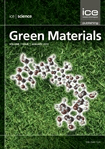
Green Materials
Exploring the future of eco-friendly materials.Green Materials, published by Emerald Group Publishing Ltd, serves as a crucial platform for research within the realm of sustainable materials science. Since its inception in 2013, this journal has focused on addressing pressing global challenges, particularly in Materials Chemistry, Pollution, and Polymers and Plastics, as evidenced by its rankings within the Q3 Quartiles. With a commitment to high-quality, peer-reviewed content, it caters to an audience keen on innovative solutions that promote environmental sustainability. Researchers and professionals can access a wealth of knowledge and insights that are instrumental in advancing the field, despite the absence of an open-access option. As the journal continues to converge towards its projected endpoint in 2024, it remains a vital resource for those dedicated to exploring the intersection of materials science and ecological responsibility, ensuring its relevance in academic discussions and practical applications.
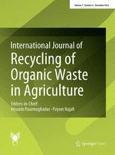
International Journal Of Recycling of Organic Waste in Agriculture
Revolutionizing Organic Waste Management in AgricultureInternational Journal of Recycling of Organic Waste in Agriculture is a pioneering open-access journal, established in 2012 and published by the Islamic Azad University, Isfahan-Khorasgan Branch, Iran. With ISSN 2195-3228 and E-ISSN 2251-7715, this journal focuses on innovative research and development in the field of organic waste recycling within agricultural contexts. As indicated by its latest metrics, it holds a respectable ranking in the Q2 quartile in Agricultural and Biological Sciences and Q3 in Waste Management and Disposal for 2023. This positions the journal as a valuable resource for professionals, researchers, and students invested in sustainable agricultural practices and waste management strategies. With its commitment to advancing knowledge and fostering interdisciplinary dialogue, the journal serves as an essential platform for disseminating significant findings that can positively impact environmental sustainability and agricultural productivity worldwide.
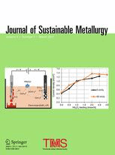
Journal of Sustainable Metallurgy
Advancing sustainable practices in metallurgy.Journal of Sustainable Metallurgy is a leading academic journal published by Springer, dedicated to advancing knowledge in the field of sustainable metallurgy and material sciences. With an ISSN of 2199-3823 and E-ISSN 2199-3831, this journal occupies a pivotal role in the intersection of Environmental Science, Materials Science, and Engineering, boasting a commendable impact factor and significant visibility in scholarly discussions. Operating under a Q2 category in 2023 across various rankings, including Environmental Science and Mechanics of Materials, it provides valuable insights for researchers, industry professionals, and students focusing on sustainable practices in metallurgy. The journal's aim is to disseminate high-quality research that addresses the technical challenges and innovations in material sustainability from 2015 to 2024. Through robust peer-review processes, it ensures the dissemination of rigorous research, fostering an informed dialogue within the global materials community. For those interested in open access options, please refer to the publisher's website for more information.

Resources-Basel
Advancing sustainable practices in environmental science.Resources-Basel is a premier open access journal published by MDPI, specializing in the fields of environmental science, management, and landscape conservation. Since its inception in 2012, the journal has established itself as a reputable source of scholarly research and discourse, achieving notable rankings including Q2 in Management, Monitoring, Policy and Law and Q1 in Nature and Landscape Conservation as of 2023. With impressive Scopus rankings, including a 27th place in the category of Environmental Science focused on Nature and Landscape Conservation, and a 82nd in Management, Monitoring, Policy and Law, Resources-Basel plays a crucial role in advancing knowledge and best practices within these vital domains. Based in Basel, Switzerland, the journal embraces the open access model, ensuring that research is widely accessible to scholars, practitioners, and the public alike, catering to the pressing issues of sustainable resource management and environmental conservation. Researchers, professionals, and students are encouraged to engage with the latest findings published here, contributing to the global discourse on sustainable practices and policy innovation.
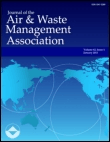
JOURNAL OF THE AIR & WASTE MANAGEMENT ASSOCIATION
Innovating Strategies for a Cleaner, Greener PlanetJOURNAL OF THE AIR & WASTE MANAGEMENT ASSOCIATION is a leading publication in the fields of environmental science, pollution control, and waste management, published by Taylor & Francis Inc in the United Kingdom. With an impressive history of publication dating back to 1989 and a commitment to advancing knowledge and practice in these critical areas, this journal serves as a valuable resource for researchers, professionals, and students alike. It holds a 2023 impact factor reflected through its competitive rankings in four distinct categories: Q3 in Atmospheric Science and Q2 in Management, Monitoring, Policy and Law, Pollution, and Waste Management and Disposal. The journal's dedication to disseminating innovative research and best practices plays a vital role in enhancing environmental policies and strategies globally. Although not currently Open Access, the journal is accessible through its ISSN 1096-2247 and E-ISSN 2162-2906, providing opportunities for rich academic discussion and collaboration in addressing pressing environmental challenges.

ENVIRONMENTAL ENGINEERING SCIENCE
Driving impactful discoveries in environmental chemistry.ENVIRONMENTAL ENGINEERING SCIENCE is a leading journal published by MARY ANN LIEBERT, INC that provides a platform for pioneering research in the fields of environmental chemistry, pollution control, and waste management. With an ISSN of 1092-8758 and an E-ISSN of 1557-9018, this peer-reviewed journal aims to disseminate high-quality scientific studies that address critical environmental challenges. As evidenced by its 2023 category quartile rankings, it holds a notable position at Q3 in Environmental Chemistry and Pollution and Q2 in Waste Management and Disposal, highlighting its relevance and impact in these domains. Spanning over two decades from 1997 to 2024, the journal is dedicated to fostering innovations and promoting rigorous scholarship that can contribute significantly to sustainable environmental practices globally. Authors and researchers are encouraged to engage with this essential resource, which offers Open Access options to enhance the visibility and reach of their work. For those interested in advancing their understanding and practice within the environmental sciences, ENVIRONMENTAL ENGINEERING SCIENCE is an indispensable journal to consider.

WASTE MANAGEMENT & RESEARCH
Leading the way in pollution and waste management insights.WASTE MANAGEMENT & RESEARCH, published by SAGE PUBLICATIONS LTD, is a premier journal dedicated to advancing the field of waste management and environmental concern. Established in 1983, this esteemed publication spans a comprehensive range of topics within Environmental Engineering, Pollution, and Waste Management and Disposal, with remarkable standings including a Q1 ranking in Environmental Engineering and a Q2 ranking in both Pollution and Waste Management and Disposal as of 2023. With an impressive Scopus ranking, placing it in the top percentiles of its categories, the journal serves as a vital resource for researchers, professionals, and students seeking to explore innovative solutions to waste management challenges. Although not an open access journal, its rigorous peer-review process ensures high-quality and novel research is made available to the academic community. Located in London, UK, WASTE MANAGEMENT & RESEARCH continues to be influential in shaping policies and practices that impact sustainable waste management practices worldwide.
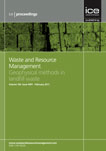
Proceedings of the Institution of Civil Engineers-Waste and Resource Management
Exploring New Frontiers in Waste and Resource ManagementProceedings of the Institution of Civil Engineers-Waste and Resource Management is a pivotal journal published by Emerald Group Publishing Ltd, dedicated to advancing knowledge in the fields of civil and structural engineering as well as waste management. With an ISSN of 1747-6526 and an e-ISSN of 1747-6534, this journal has been instrumental in facilitating the exchange of innovative research and best practices from 2008 through 2024. Although it currently ranks in the lower quartiles (Q4) in its categories, its commitment to enhancing sustainable practices in engineering makes it a valuable resource for researchers, professionals, and students alike. The journal aims to foster multidisciplinary dialogue and provide insights into effective waste management solutions and resource optimisation techniques, critical for today's environmental challenges. With a geographic focus in the United Kingdom and an accessible platform for contributions, this publication is positioned to play an essential role in shaping the future of sustainable engineering practices.